Economy
EU still seeks US trade deal but urged to toughen stance
The European Union remains hopeful of reaching a trade agreement with the United States despite President Donald Trump’s intensified threat of 30% tariffs, the bloc’s trade chief said Monday, amid growing pressure on Brussels to adopt a firmer stance.
European Trade Commissioner Maros Sefcovic’s remarks came as EU ministers agreed on Monday to prioritise negotiations with the United States to avoid the levies that the trade chief said would wreck transatlantic trade.
Trump threw months of painstaking talks into disarray on Saturday by announcing he would hammer the bloc with the sweeping tariffs if no agreement is reached by Aug. 1.
Heading into Brussels talks with EU trade ministers, Sefcovic said despite Trump’s latest threat, he “felt” Washington was ready to continue negotiating – and he planned to speak with his U.S. counterparts later in the day.
Sefcovic, who is leading talks on behalf of the EU’s 27 states, said reaching a deal remained the priority – while acknowledging calls from countries including key power France for the bloc to flex its muscles in negotiations.
“The current uncertainty caused by unjustified tariffs cannot persist indefinitely,” Sefcovic told reporters, adding the EU was preparing for “all outcomes,” including “well-considered, proportionate countermeasures.”
A 30% tariff rate would make it almost impossible to continue trading as before, with enormous consequences for supply chains and negative impacts on both sides of the Atlantic.
“And therefore I think we have to do, and I will definitely do, everything I can to prevent this super-negative scenario,” Sefcovic told reporters before the meeting on Monday.
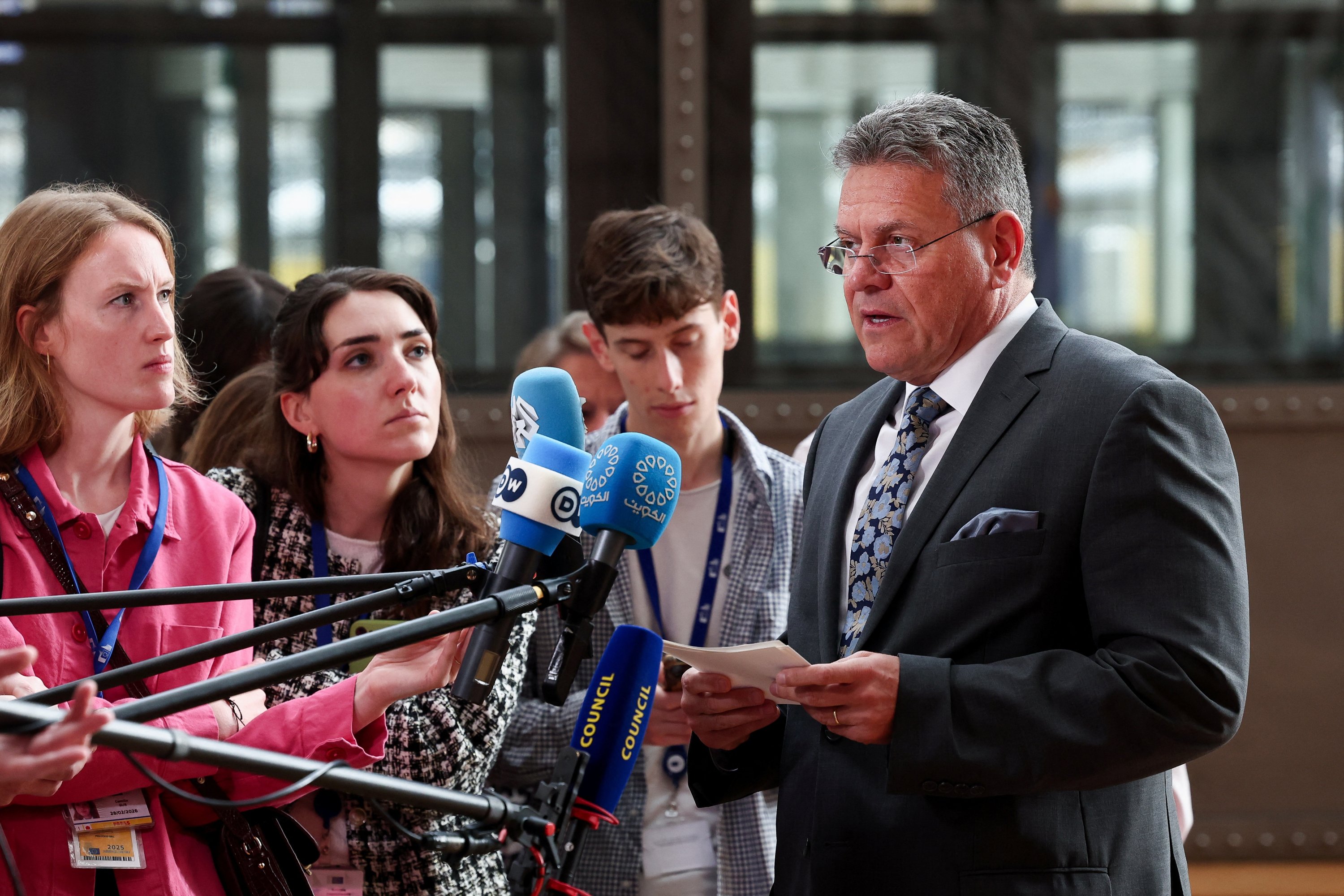
European Commission chief Ursula von der Leyen on Sunday delayed a package of retaliatory measures over U.S. tariffs on steel and aluminium – a day before they were set to kick in – as a sign of goodwill.
But diplomats said an additional package of reprisal measures would be presented to trade ministers Monday that could be rolled out if Trump imposes the 30% tariffs.
The EU threatened in May to target a much bigger swathe of U.S. goods, including cars and planes, if talks fail. Diplomats said the finalized list was expected to be worth 72 billion euros ($84.2 billion).
‘Prepare for war’
France’s Trade Minister Laurent Saint-Martin said retaliation plans should be drawn up with “no taboos,” adding the weekend’s setback called for a rethink of the bloc’s tactics.
“If you hold anything back, you are not strengthening your hand in negotiations,” he said at the Brussels talks. “Obviously, the situation since Saturday requires us to change our strategy.”
Denmark’s Foreign Minister Lars Lokke Rasmussen, whose country currently holds the EU presidency, said Brussels needed to show its strength.
“We don’t want any kind of trade war with the US… we don’t want to escalate things,” he said.
“We want a deal, but there’s an old saying: ‘if you want peace, you have to prepare for war,'” he said ahead of the talks.
EU nations – some of which export far more to the United States than others – have sought to stay on the same page over how strong a line to take with Washington in order to get a deal.
French President Emmanuel Macron on Saturday urged von der Leyen’s commission to “resolutely defend European interests” and said the EU should step up preparation for countermeasures.
German Chancellor Friedrich Merz agreed and said he had spoken to Macron, Trump and von der Leyen in the past few days and would “engage intensively” to try to find a solution.
Deals and duties
Brussels had readied duties on U.S. goods worth around 21 billion euros in response to the levies Trump slapped on metal imports earlier this year.
But it held off on those measures to give space to find a broader trade agreement – and has now suspended them again until early August.
Since returning to the presidency in January, Trump has unleashed sweeping stop-start tariffs on allies and competitors alike, roiling financial markets and raising fears of a global economic downturn.
But his administration faces pressure to secure deals with trading partners after promising a flurry of agreements.
So far, U.S. officials have only unveiled two pacts, with Britain and Vietnam, alongside temporarily lower tit-for-tat duties with China.
The EU, alongside dozens of other economies, had been set to see its U.S. tariff level increase from a baseline of 10% last Wednesday, but Trump pushed back the deadline to Aug. 1.
The EU tariff is markedly steeper than the 20% levy Trump unveiled in April – but paused initially until mid-July.
Thomas Byrne, the minister for Ireland, whose pharmaceutical industry puts it on the front line of Trump’s trade war along with industrial powerhouse Germany, called for Europe to “work our hardest” for a deal before Aug. 1.
“That gives us certainty, it protects investments, it protects jobs,” he said.
Economy
UK inflation jumps in June to its highest in over year
The annual rate of inflation in the U.K. unexpectedly rose to its highest level in over a year, at 3.6% in June, according to official figures released on Wednesday. This potentially makes it a tougher call for the Bank of England (BoE) to cut interest rates next month.
June’s reading from the Office for National Statistics (ONS) – took the annual consumer price index (CPI) rate to its highest since January 2024 – against expectations from economists in a Reuters poll for it to remain unchanged at May’s reading of 3.4%.
British inflation has risen steadily since touching a three-year low of 1.7% last September, and in May the Bank of England forecast it would peak at 3.7% in September – almost twice the central bank’s 2% target.
Sterling rose slightly against the dollar after the data, which may put pressure on the BoE not to cut interest rates at its next meeting in August.
“While we still expect the Bank of England’s Monetary Policy Committee to continue gradually cutting rates, today’s upside inflation surprise means its August decision will be finely balanced,” Martin Sartorius, principal economist at the Confederation of British Industry, said.
Higher costs for motor fuels, air fares and rail fares were the biggest contributors to the rise in the inflation rate between May and June, the ONS said and it also noted an increase in the cost of clothing, shoes, red wine and lager.
Previously, April saw a particularly sharp jump in inflation to 3.5% from 2.6% due to rises in regulated energy and water tariffs, a spike in air fares, and upward pressure on the cost of labour-intensive services from an increase in employment taxes and the minimum wage.
Despite this, Governor Andrew Bailey has said interest rates are likely to remain on a gradual downward path, as a weaker labour market puts downward pressure on wage growth and the outlook for economic growth remains lacklustre.
The BoE has cut interest rates by four quarter-point steps since August, and economists polled by Reuters last month forecast two more quarter-point rate cuts this year, including a likely move in August.
However, some BoE policymakers are concerned that skills mismatches in Britain’s labor market and other supply constraints will keep wage growth running too fast for inflation to return to target any time soon.
Services price inflation, a measure the BoE views as a better guide to domestically generated price pressures than the headline CPI rate, held at 4.7% in June, in contrast to economists’ forecasts for it to fall to 4.6%.
Food and non-alcoholic drink prices were 4.5% higher than a year earlier, the biggest rise since February 2024.
The BoE forecast in May that headline inflation would be back on target in the first quarter of 2027.
Economy
Indonesia hails ‘new era’ with US after Trump lowers tariff to 19%
Indonesia’s leader lauded on Wednesday a “new era” of trade relations with the U.S., following President Donald Trump’s announcement that he had lowered the tariff rate faced by Southeast Asia’s largest economy from 32% to 19%.
The Trump administration has been under pressure to finalize trade pacts after promising a flurry of deals recently, as countries sought talks with Washington to avoid the U.S. president’s threatened tariffs, announced in April but delayed until August.
“I had a very good call with President Donald Trump. Together, we agreed and concluded to take trade relations between Indonesia and the U.S. into a new era of mutual benefit,” Indonesia’s President Prabowo Subianto wrote in an Instagram post.
Prabowo, a populist former general, posted pictures of himself laughing on the phone with Trump but did not give any specifics of the deal.
However, Prabowo’s presidential spokesperson confirmed the new 19% rate and stated that it resulted from direct negotiations between the Indonesian leader and Trump.
“It is an extraordinary negotiation conducted directly by our president with President Donald Trump,” Hasan Nasbi said, adding that the deal was “progress that cannot be called small.”
Prabowo was set to land back in Indonesia on Wednesday afternoon from a trip to Europe, before giving a statement, Nasbi said.
Trump said Tuesday he had struck the pact in return for significant purchase commitments from Jakarta following negotiations, including a pledge to buy 50 Boeing jets.
In return for a lower tariff, Indonesia has committed to spending billions to increase energy, agriculture and merchandise imports from the U.S.
Trump and Prabowo have developed a warm relationship since the U.S. leader first clinched the presidency in late 2016.
His first administration dropped a de facto U.S. visa ban for Prabowo over alleged crimes committed under late dictator Suharto, inviting him to Washington in 2020 when he was the Indonesian defense minister.
‘Significant risk’
Prabowo had sent his top economic minister to Washington and his administration secured a better deal than the 20% that Trump said he had given to Southeast Asian neighbor Vietnam.
Both Indonesia and Vietnam are key markets for the transshipment of Chinese goods. Trump said the deal with Indonesia would include a penalty for goods transiting Indonesia from China.
Prabowo had suggested after the initial tariff threat in April that Trump might be helping Jakarta by prompting it to reconsider its trade surplus with the world’s largest economy.
Data from the U.S. Trade Representative’s office indicates that Washington’s goods trade deficit with Indonesia was $17.9 billion in 2024, a 5.4% increase from the previous year.
But experts said the deal appeared to be one-sided.
“The 19% tariff on Indonesian exports to the U.S., while the U.S. can enjoy 0%, actually poses a significant risk to Indonesia’s trade balance,” said Bhima Yudhistira Adhinegara, executive director of the Center of Economic and Law Studies.
“Do not be too reliant on exports to the U.S., because the result of the tariff negotiation is still detrimental to Indonesia’s position.”
Economy
July 15 ‘spirit’ seen as catalyst for Türkiye’s economic progress
Turkish economy management and the business community on Tuesday paid tribute to the nation’s resilience and unity, marking the anniversary of the defeated July 15 coup attempt, highlighting how the spirit of resistance has also become a driving force for the economy.
Tuesday marked nine years since the Gülenist Terror Group (FETÖ) and its U.S.-based leader Fetullah Gülen orchestrated the coup that left 251 people dead and thousands more injured. Gülen died in Pennsylvania, U.S., in October 2024.
Hundreds of companies were seized and handed over to the Savings Deposit Insurance Fund (TMSF) due to their links to FETÖ.
Business leaders emphasized that the coup attempt was thwarted by citizens from all walks of life uniting around the national will. That unity, government officials and industry leaders say, has since served as a powerful catalyst for rebuilding and strengthening the Turkish economy.
They commemorated heroes who gave their lives for the homeland, and extended gratitude and appreciation to veterans.
Industry and Technology Minister Mehmet Fatih Kacır described July 15 as the day the Turkish nation “declared to the world it would never submit to disgrace.”
“It is the name of the glorious resistance in which the Turkish nation stood up for its will, independence and future,” Kacır said. “The victory we achieved under the leadership of our President and Commander-in-Chief, Recep Tayyip Erdoğan, is a symbol of our nation’s unity and determination,” he added. “The name of the victory is Türkiye.”
‘Türkiye’s energy doesn’t bow to coups’
Agriculture and Forestry Minister Ibrahim Yumaklı echoed Kacır’s message, emphasizing the “courage and resolve” of citizens who confronted tanks and bullets in defense of democracy.
Trade Minister Ömer Bolat called the events of July 15 a “victory of resistance for freedom,” citing the unity between Erdoğan’s leadership and the people’s patriotic spirit.
He said the uprising left a sacred mark in history and sent a clear message that “no chains could bind the Turkish nation’s will.”
Energy and Natural Resources Minister Alparslan Bayraktar linked the spirit of July 15 to Türkiye’s ongoing pursuit of energy independence.
“Today, we continue to work with the same determination and spirit of July 15 to achieve full energy independence,” he said.
“Energy independence means a greater and stronger Türkiye. In this pursuit, we are tirelessly striving day and night to lead our country to energy sovereignty,” he added.
“Türkiye’s energy does not bow to coups.”
Major cost
Business representatives highlighted how the unity displayed on July 15 has translated into economic momentum and resilience over the past nine years.
Independent Industrialists and Businessmen’s Association (MÜSIAD) President Burhan Özdemir pointed out that what the Turkish nation protected by standing up for its will on July 15 was not only democracy, but also the Turkish economy.
Özdemir that the FETÖ terrorist organization sought to damage not only economic capacity but also poison human capital.
The coup attempt targeted a Türkiye that had paid off its IMF debt in 2013, achieved 27 consecutive quarters of growth, strengthened its financial and fiscal discipline and was preparing to launch many major projects, he noted.
“Although markets returned to normal shortly after July 15 thanks to successful economic policies, the coup attempt had significant costs,” Özdemir said. Initial estimates put the cost at around TL 300 billion, and considering its impact on sub-sectors, this figure likely increased further, he added.
Özdemir also emphasized a sharp rise in the exchange rate, market panic, and disruptions in production and economic activity further deepened the damage.
While the Turkish economy had grown by 4.5% and 4.7% in the first two quarters of that year, it contracted by 0.2% in the third quarter. It closed the 2016 with an annual growth of 2.9%.
All these costs, Özdemir said, have not overshadowed the economic gains achieved over the past two decades.
Istanbul Chamber of Commerce (ITO) President Şekib Avdagiç praised the Turkish people for rallying around Erdoğan and defending democracy. “The era of coups in Türkiye ended that night,” Avdagiç said, adding that people from all political backgrounds resisted with a collective heart.
Avdagiç warned of what could have happened had the coup succeeded: “Türkiye would have become a helpless country left at the mercy of those who want to reshape our region… Who would have stood up for Gaza, or said ‘stop’ in Syria?”
He emphasized that Türkiye’s economic recovery since then has been driven by national resolve: “We believe that the wheels of trade and economy turn with the winds of freedom.”
Seized companies’ performance
The number of FETÖ-linked companies run by the TMSF stands at 533, compared to 1,371 in the aftermath of the coup attempt, according to a report by the Turkish business daily Nasıl bir Ekonomi.
At the time of transfer, the combined asset size of the 533 companies was TL 35 billion. As of Dec. 31, 2024, this figure grew by 518%, reaching TL 229.5 billion.
Their total equity at the time of transfer was TL 12.7 billion. By the end of 2024, it had increased by 908%, reaching TL 128 billion, the report said.
The combined turnover of these companies reached TL 133 billion as of last year. These companies currently employ 21,976 people.
Mustafa Gültepe, head of the Türkiye Exporters Assembly (TIM), emphasized the role of production and exports in increasing national prosperity.
“This is why we approach production and exports with a sense of national duty. All our game plans and strategies are designed with the long-term goal of placing Türkiye among the world’s top 10 exporting countries,” Gültepe said.
“Of course, we know that reaching this goal is not easy. At times, global developments or domestic factors can slow our momentum.”
Türkiye reached record annual exports in 2023 and 2024, but Gültepe says they do not consider the growth in shipments sufficient.
“We started 2025 with an export target of $280 billion, and although we are 4.1% ahead compared to the same period last year in the first half of the year, we are still below the desired level,” he noted.
“For our medium- and long-term goals, we need to grow our exports by double-digit rates every year.”
Door to coups closed
Gültepe also stressed the importance of stability and predictability, suggesting that various attempts are made – both internally and externally – to try to destabilize Türkiye and disrupt the atmosphere in the country.
“On July 15, 2016, we faced one of those vile attempts. The coup attempt by a treacherous terrorist organization that infiltrated all state institutions – especially the Turkish Armed Forces, law enforcement, and judiciary – was thwarted by the resolute leadership of our president and the unwavering determination of our people, even at the cost of their lives,” said Gültepe.
“On that night, our nation declared loudly and clearly to both friends and foes that it would never allow another coup in Türkiye.”
Istanbul Commodity Exchange (ISTIB) President Ali Kopuz described the failed coup as a turning point.
“Thanks to the foresight and courage of our people, the door to coups in Türkiye is now closed,” he said. He warned, however, that threats will always remain and called for continued vigilance and excellence in every professional field.
“Therefore, while continuing the fight against the remnants of FETÖ, we must also remain constantly vigilant against all threats. By performing our work in the highest quality across the sectors we operate in, we must strive to build a stronger and more prosperous country.”
Economy
US inflation picks up in June as Trump’s tariffs begin to weigh in
U.S. consumer inflation picked up in June, in line with analyst estimates for the surge in costs, government data showed Tuesday, as policymakers try to gauge how President Donald Trump’s ever-growing list of tariffs is affecting the economy.
Observers are expecting to learn more about the effects of Trump’s duties over the summer months, meaning June’s data marks the start in a series of closely-watched figures – particularly as officials mull changes to interest rates as well.
The consumer price index (CPI) was up 2.7% from a year ago in June, rising from the 2.4% figure in May as energy costs rose, said the Department of Labor.
Other areas that saw cost increases included household furnishings and apparel, both segments that experts are eyeing for signs of cost hikes after Trump’s sweeping tariffs this year.
While Trump imposed a 10% tariff on almost all trading partners in April and separately slapped steeper duties on imports of steel, aluminum and autos, U.S. officials have pushed back against warnings that these could spark price increases.
Economists caution that tariff hikes could fuel inflation and weigh on economic growth, but U.S. Treasury Secretary Scott Bessent has labeled such expectations “tariff derangement syndrome.”
CPI rose 0.3% in June from the previous month, an uptick from the 0.1% increase in May as well.
Excluding the volatile food and energy segments, CPI climbed 0.2% month-on-month, picking up from May too.
Compared with a year ago, “core” CPI was up 2.9% in June.
Even if headline inflation figures show no “meaningful” surge because of tariffs alone, Nationwide economist Oren Klachkin warned it may be too soon to see their full impact just yet.
Businesses have been trying to hold off consumer price hikes through a range of actions, from eating into their own margins to trying to share costs with their suppliers, he said.
But it remains to be seen how long they can do this.
There could be a bigger impact over the summer, Klachkin added.
For now, he is looking “under the surface” at components most exposed to Trump’s tariffs, such as furnishings, recreational goods and cellphones, to discern their effects.
Besides steep tariffs that have already taken effect, Trump has also threatened even higher levels on dozens of key trading partners including the European Union, India, Japan and South Korea if they do not strike deals to avert these elevated levels.
He has also opened doors to further levies on sector-specific imports ranging from semiconductors to pharmaceuticals, injecting more uncertainty in the global economy and worries of supply chain snags.
Economy
For Europe, 30% US tariff would be game-changer
The 30% tariff on European goods threatened by U.S. President Donald Trump would, if implemented, be a major blow to Europe, potentially dismantling large segments of transatlantic trade and compelling the bloc to reassess its export-driven economic strategy.
European ministers meeting in Brussels on Monday remained convinced they can bring Trump back from the brink before his Aug. 1 deadline and reach a deal that would keep the $1.7 trillion two-way trading relationship broadly intact.
But the wild swings in Trump’s mood toward the European Union – which he has sometimes labelled as friendly and at other times accused of being set up specifically to destroy the United States – keep the 30% threat very much alive for now.
“It will be almost impossible to continue the trading as we are used to in a transatlantic relationship,” EU trade chief Maros Sefcovic said of the 30% rate before meeting ministers and officials of the 27 EU capitals to give them an update.
“Practically, it prohibits the trade.”
EU officials had been hoping they could limit the damage by agreeing on a baseline tariff of around 10% – the one currently in place – with additional carve-outs for key sectors like autos.
Last year, the United States accounted for a fifth of all EU exports – its largest partner. Trump’s bugbear is the $235 billion U.S. deficit generated by the goods component of that trade, even though the U.S. earns a surplus on services.
Upend policy plans
The impact of making European exports – from pharmaceuticals to autos, machinery or wine – too expensive to be viable for American consumers would be instantly tangible.
Economists at Barclays estimate that an average tariff rate on EU goods of 35% including both reciprocal and sectoral duties, combined with a 10% retaliation from Brussels, would shave 0.7 percentage points off eurozone output.
This would eat up most of the eurozone’s already meagre growth and likely lead the European Central Bank (ECB) to cut its 2% deposit rate further.
“Inflation would likely undershoot the 2% target more deeply, and for longer, prompting a more accommodative monetary policy stance – with the deposit rate potentially reaching 1% by (March 2026),” the Barclays economists said.
An earlier estimate by German economic institute IW found tariffs of 20% to 50% would cost Germany’s 4.3 trillion euro economy more than 200 billion euros between now and 2028.
While arguably small in percentage terms, that lost activity could still upend Chancellor Friedrich Merz’s plans to push through tax cuts and spend more on renewing the country’s long-neglected infrastructure.
“We would have to postpone large parts of our economic policy efforts because it would interfere with everything and hit the German export industry to the core,” Merz said at the weekend of a 30% rate.
Nowhere to run
Further down the line, it raises bigger questions over how Europe recoups the lost activity to generate the tax revenues and jobs needed to fund ambitions ranging from caring for ageing populations to military rearmament.
Under its existing policy of trade diversification, the EU has done well in striking preliminary deals with new partners but – as the continued delay over completion of the giant EU-Mercosur trade pact shows – it has struggled to get them fully signed and sealed.
“The EU does not have different markets to pull up to and sell into,” Varg Folkman, policy analyst at the European Policy Centre think tank, said of the long and complex timelines involved in classic free trade deals.
Some observers have argued the standoff with Trump is what the EU needs to complete long-delayed reforms of its single market, boosting domestic demand and rebalancing its economy away from exports, which account for around half of output.
The International Monetary Fund (IMF) has estimated the EU’s own internal barriers to the free flow of activity are the equivalent of tariffs of 44% for goods and 110% for services. Mooted reforms such as creating freer cross-border capital markets have made little headway in more than a decade.
“It is easier said than done. There isn’t an agreement to deepen. The barriers are imposed by the EU members themselves to benefit their own,” Folkman said of the web of national regulations.
How all this plays into the EU’s negotiating strategy in the less than three weeks ahead remains to be seen – but for now, the bloc has stuck to its line of being open to talks while readying retaliatory measures if they break down.
One thing that might persuade Trump to reach a deal, some European observers suggest, is that the lingering uncertainty may by itself push back the timing of the Federal Reserve (Fed) interest rate cut the U.S. president so desires.
“The latest developments on the trade war suggest that it will take more time to get a sense of the ‘landing zone’ on tariffs … which of course raises uncertainty for everyone, including the Fed,” AXA chief economist Gilles Moec said.
“With this new salvo … calls for cutting quickly get even harder to justify.”
Economy
Türkiye, Malaysia aim to strengthen cooperation in Islamic finance
Türkiye and Malaysia can and should work together in a time when the world is seeking more direction and clarity, the chairperson of a Malaysian center focusing on Islamic finance said in an interview published on Tuesday.
“Türkiye and Malaysia can and should work together in a time when the world is seeking more direction and clarity. We are in a phase where we must continue to build and strengthen our relations,” said Tan Sri Azman Mokhtar, the chairperson of Malaysia International Islamic Financial Centre (MIFC) Leadership Council (MLC).
Speaking to Anadolu Agency (AA), Mokhtar emphasized Türkiye’s significance, both in its region and globally, explaining that they aim to advance the strong economic, financial, and investment ties between Türkiye and Malaysia.
“The Future of Islamic Finance: Türkiye-Malaysia Business Forum” was held recently in cooperation with the Presidency’s Investment Office and MIFC MLC.
As part of the program, more than 20 senior financial representatives operating in areas such as Islamic banking, capital markets and takaful (Islamic insurance) came to Türkiye, along with heads of regulatory and supervisory institutions.
The program focused on promoting the Istanbul Financial Center (IFC), showcasing investment opportunities in Türkiye, strengthening public-private cooperation and evaluating investment prospects through one-on-one meetings.
Islamic finance, which has emerged in recent years as an alternative model, continues to grow and is expanding its influence, especially in the Gulf countries, Southeast Asia and Africa.
Due to its promotion of financial inclusion in developing countries and its foundation on ethical principles, Islamic finance is expected to become more widespread across broader geographies in the future. Türkiye stands out as a key part of this growing trend.
Legal reforms in participation finance, the establishment of new participation financial institutions, and the aim of turning Istanbul Financial Center into a global hub are all strengthening Türkiye’s Islamic finance ecosystem.
As of 2024, participation banking holds an 8.5% share in the country’s banking sector, and this is expected to reach double digits in the coming years.
Additionally, initiatives such as participation-based insurance, sukuk issuance (Islamic bonds) and the diversification of interest-free financial products support Türkiye’s goal of becoming a regional Islamic finance center.
In his remarks to AA, Mokhtar noted that trade between the two countries exceeds $5 billion (TL 200.87 billion), adding, however, that there is room to “grow this even further.”
“Our relationship is truly strong,” he said.
Mokhtar explained that in Malaysia, Islamic finance constitutes almost half of the banking system and two-thirds of the capital markets.
Highlighting Türkiye’s significance regionally and globally, Mokhtar added: “Malaysia currently holds the chairmanship of the Association of Southeast Asian Nations (ASEAN). Türkiye and Malaysia can and should work together in a time when the world is seeking more direction and clarity. We are in a process where we must continue to build and strengthen our relations.”
He also mentioned witnessing the development of the Istanbul Financial Center closely and recalled opening an office in Istanbul during his time as CEO of Khazanah Nasional to invest in Türkiye and the region, a branch that is still active today.
Moreover, he drew attention to Türkiye’s regional influence and its role in participation finance.
“Türkiye is not just about Türkiye. It is a bridge economy for Central Asia, Africa, the Middle East and North Africa. There is serious potential in the participation finance,” he remarked.
“Much of this potential is already being realized. As Malaysia, we will continue to be part of this bridge, just as we are in our own region,” he added.
Mokhtar emphasized that the global financial world is searching for direction, with ongoing issues and instability in monetary policy, climate initiatives, and environmental, social and governance (ESG) efforts.
He said that Islamic finance is rooted in social justice, and that they have transformed this tradition into a modern framework.
Highlighting the system’s growth potential, he added: “Islamic finance is growing much faster than the global financial system today, but in percentage terms, we are still relatively small. That means there is plenty of room for growth.”
-
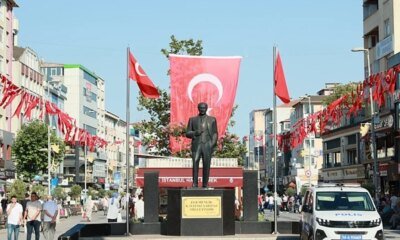
 Daily Agenda2 days ago
Daily Agenda2 days agoFlags are fluctuating for Türkiye without terrorism
-

 Sports2 days ago
Sports2 days agoConfusion hits as Trump joins Chelsea’s Club World Cup celebrations
-
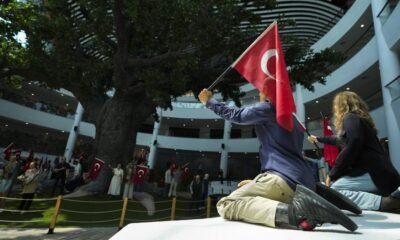
 Economy2 days ago
Economy2 days ago9 years on, business community salutes ‘inspiring spirit’ of July 15
-

 Politics2 days ago
Politics2 days agoTerror-free Türkiye set to head to Parliament
-
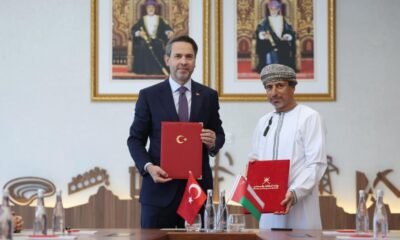
 Economy2 days ago
Economy2 days agoTürkiye, Oman sign deal for oil, gas search, renewable energy co-op
-

 Daily Agenda2 days ago
Daily Agenda2 days agoTurkuvaz Media is the first central media organization to decipher FETÖ! The backbone of the fight against treacherous organization is morning
-
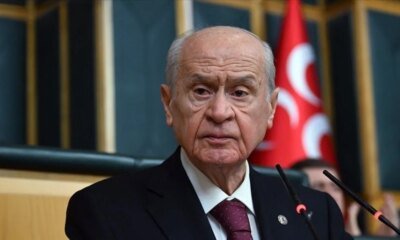
 Daily Agenda2 days ago
Daily Agenda2 days agoMHP leader Devlet Bahceli from July 15 Message: The head of the traitors was crushed
-
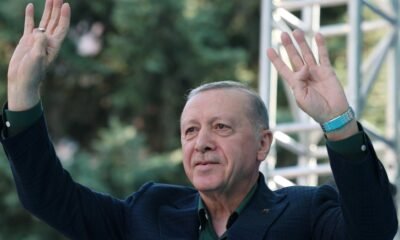
 Politics2 days ago
Politics2 days agoLeaders hail terror-free Türkiye success in phone calls with Erdoğan




